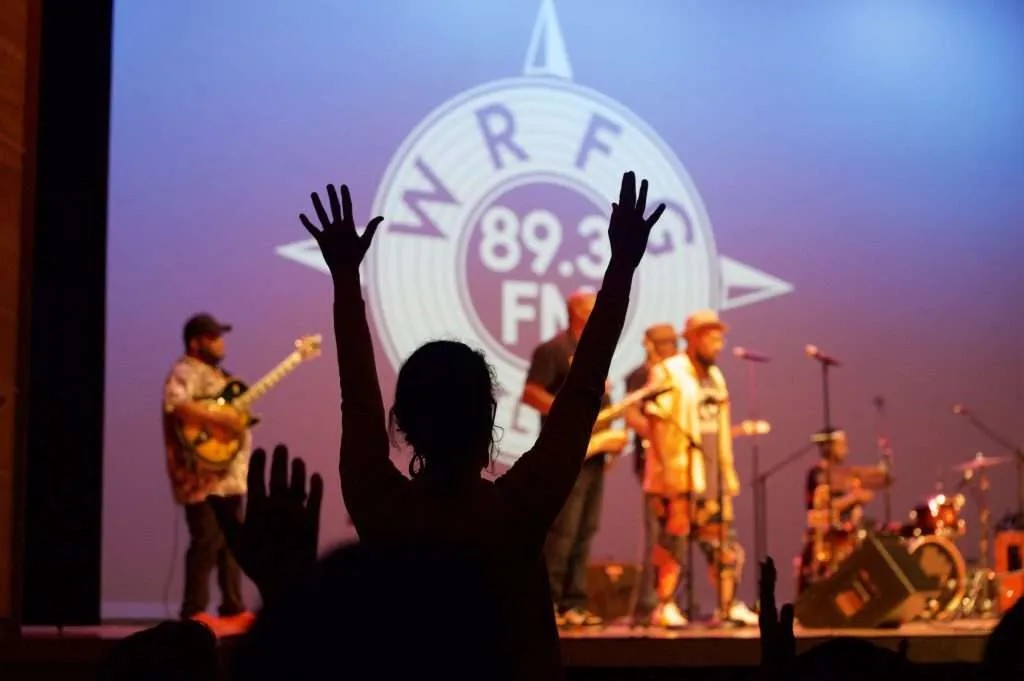
Little Five Points is a time-tested, tight-knit neighborhood, a few miles east of Atlanta’s downtown. Named after the five-point trolley car intersection around which the community grew, by the 1890’s Little Five Points had already developed into a bustling retail center. In 1920, the neighborhood was designated as one of Atlanta’s first commercial districts. Challenged by the Great Depression and in the 1960’s by a proposed demolition to allow for construction of a highway, the people of Little Five Points pulled together and pushed through. Today, the neighborhood stands as Atlanta’s center of art and invention fueled by its own blend of creative soul and public spirit.
In 2024, two local organizations–community radio station WRFG and the L5P Business Association–partnered to launch the Little Five Points Oral History Project, an initiative dedicated to celebrating and protecting their unique home. Volunteers compiled a list of some 90 L5P residents to be interviewed. Conversations are currently being recorded. The first nine can be heard through WRFG’s website.
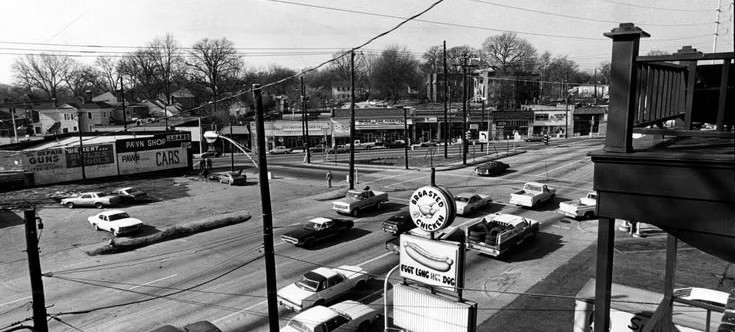
On May 23, I spoke with three project representatives who had gathered at WRFG to talk about their work:
Laverne Perry is the Development and Marketing Director at WRFG. She wrote the grant for Georgia Humanities project support and also served as a project interviewer.
Julie Schein is an Air Shifter for WRFG. She volunteered to train and to serve as an interviewer.
Kelly Stocks, a life-long resident of L5P, is Vice-President (former President) of the L5P Business Association and President of the L5P Cultural District, a new 501c3 organization in charge of arts, culture, history, and events in L5P.
We spoke about the neighborhood, present and past, about the people who have shaped the community’s vibe, and about the value of building and supporting dedicated local institutions.
This interview has been edited for clarity, length and sequencing.
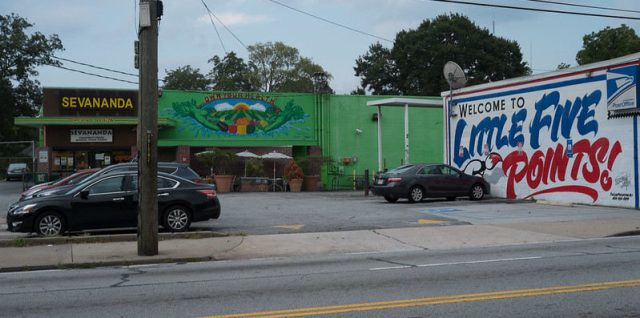
Diane: Thank you all for offering to talk with me today. Both WRFG and the L5P Business Association have deep roots in the Little Five Points community, more than 50 years. So, let’s dive right in: what makes Little Five Points special?
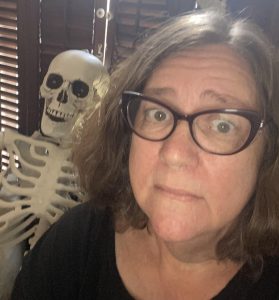
Kelly: Little Five is a funky, offbeat neighborhood on Atlanta’s east side, one of the first commercial districts outside of downtown Atlanta, built, I think, around 1920 or maybe 24. We’re known for our art, music, and independent spirit. I’ve been around forever. I’ve seen a lot of history. I grew up hearing stories from my parents; and then, when I graduated from college in 1980-something, I never left. I’m still here.
Laverne: I just want to say [that] Kelly is being modest. Little Five Points is a cultural center of the city. And one of the more popular events that happens here every year is the Little Five Points Halloween Festival and Parade [sponsored by the L5P Business Association], which, from my research, is the biggest one in the southeast.
Kelly: Thank you. That’s our season.
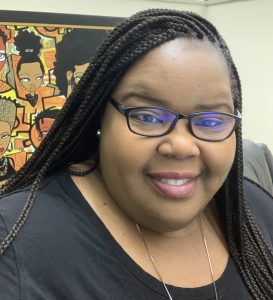
Diane: Many people in their interviews talked about the Halloween Parade, about how it unified and built pride in the community.
And that feeling for the neighborhood is one of the themes that runs through all of the project’s interviews. Chris Hollis (WRFG Station Manager) comments in one of the introductions on how many people say, ‘When I arrived here, I felt at home.’
What other community efforts make L5P special?
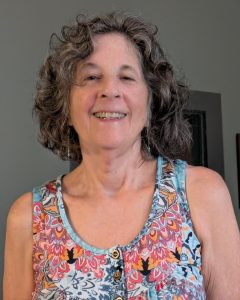
Julie: I think one thing that makes Little Five Points unique is the fact that, over the years, there’s been a deliberate attempt to keep out any chain stores. The community has risen up and tried to keep that from happening. There were two attempts before a Starbucks successfully was able to be located in Little Five Points.
There’s a pharmacist who has been in the community a really long time, and he came here when there was not a pharmacy and built the business from the ground up through exemplary customer service. And then, after he’d been established for a little while, a major [pharmacy] chain came in and they were going to locate right next to him; [but], because of all the good will he’d engendered in the community, the community was able to fight it and keep them out. They just finally decided it wasn’t worth it.
Kelly: To me, what keeps it important is we’re a neighborhood of a lot of firsts. We have [Atlanta’s] first community credit union, which is Bond [Bond Community Credit Union, a non-profit, member-owned financial institution operating since 1972]. A lot of people [who] came to this neighborhood wanted to have [homes and businesses], but they couldn’t get a loan at C&S [the Citizens and Southern National Bank], so they started Bond. WRFG was the first community radio station, a voice for the little guy, as [it] still is. Y’all were like one of the first stations to play blues. And there was Sevananda, our vegetarian grocery store that was started way before Whole Foods or way before it was cool. It seems like a neighborhood that was started out of necessity.
And every one of these I’m mentioning has been here for 50 years. I know because we always let the businesses that are 50 years or older [be] Grand Marshals at the Halloween Parade. Bond were the Grand Marshals, like y’all were last year, WRFG.
Laverne: We were one of the first stations in the city of Atlanta that played hip hop on a regular basis. In the 90s, Atlanta hip hop, Southern hip hop, was very big across the country and across the world. And WRFG was one of the first stations to play Outkast. They’re being inducted into the Rock and Roll Hall of Fame this year, and we’re actually looking at an Outkast platinum album in the office now that was presented to WRFG by their record label. WRFG was one of the first radio stations in Atlanta to play blues, hip hop, Americana and folk music on a regular basis. Playing these diverse genres of music wasn’t just a special segment that happened every once in a while; it’s incorporated into what we do every day.
Kelly: We had murals. We had art. We had theater. We had them before it was cool.
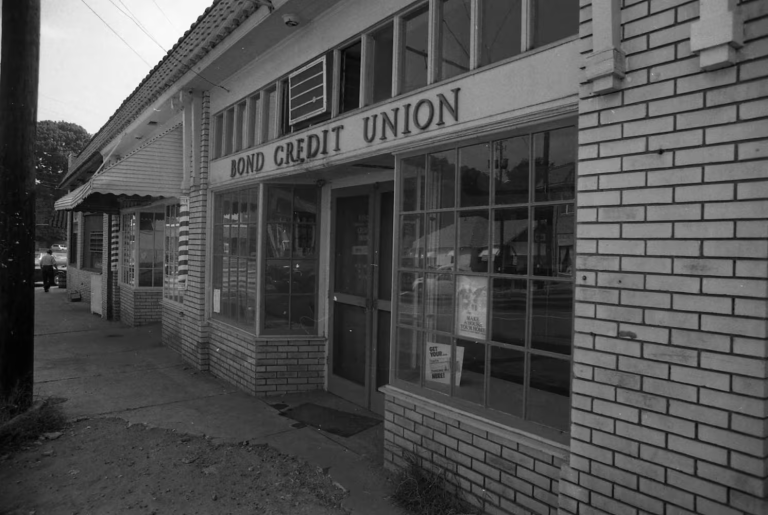
Diane: And, in addition to Bond and WRFG, have there been other 50-year community supporters who have served as Grand Marshals?
Julie: I actually interviewed someone who was a Grand Marshal, and that was Dr Victor Polizos. He had a practice here for about 33 years; and, when the community found out that he was going to retire, they asked him to be the Grand Marshal, which he was at first reluctant to do. But then his wife said, ‘We’re doing it.’ And they did. He was riding in the car next to John Lewis. They were both from Alabama, and they got to talk to each other.
Dr Polizos used to give out stickers. He never gave out candy to the kids, which I always appreciated when I brought my kids to his office. And he and his wife and his daughter decided that, on the parade, they were going to give out stickers every time the car stopped; and all of the kids [at the parade] were armed with stickers themselves. And so they were all giving each other stickers during the parade.
Diane: Was he exclusively a pediatrician?
Julie: Yes. An office in Little Five Points was like being a doctor in a small town in a big city. His one story that was really funny was that he’s getting ready to pack up about 4:45 one day, and this woman comes running across the street in her bathrobe, bare feet, with her baby in her arms. Something had happened at the house, and something happened to the baby, and she needed to be seen. So that was kind of his demonstration of how it was so great that he was so near everybody in the neighborhood. And, he wasn’t in a high rise; he didn’t have that barrier of paying for parking. He was beloved in the community.
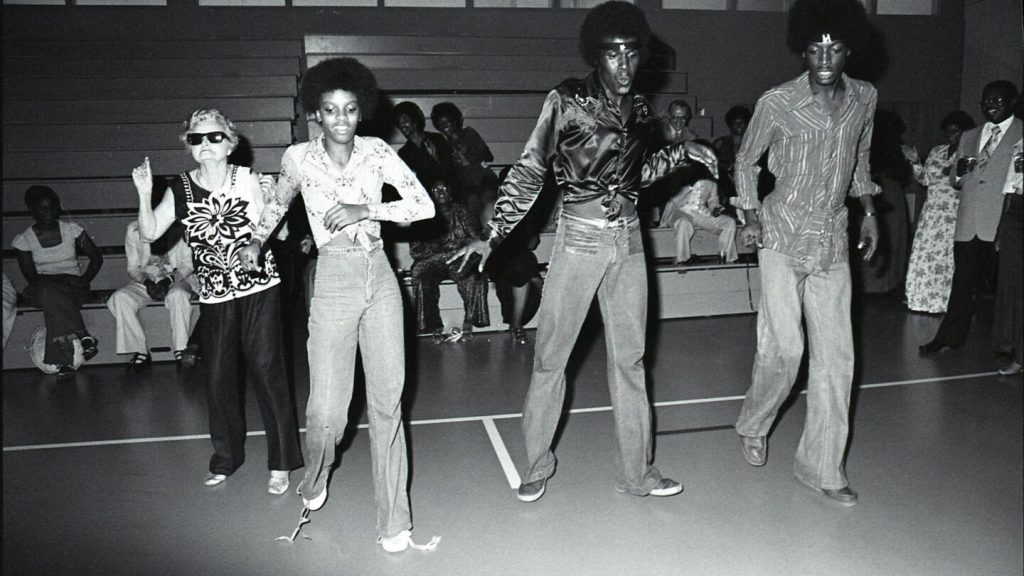
Diane: And, in his interview, I loved hearing dentist Dr. Richard Shapiro say, “People are interesting. Teeth aren’t.” He talked about opening a practice there in 1979, how 35 neighborhood people came together to buy the building, do all the renovation, with a goal of bringing health care to an economically diverse community.
I’d like to hear also about the impact of the neighborhood’s commercial and artistic centers. Julie, you talked earlier about the unity of the business community in maintaining the authenticity of the neighborhood.
Julie: Well, when Ira Katz, the pharmacist I mentioned earlier, was President of the Business Association, he created something called the Neighborhood Commercial (NC) District which set up restrictions on what any business coming in could do and also what percentage of the businesses could be restaurants versus other kinds, just to make sure there was diversity.
Kelly: Yes, [the city of Atlanta NC designation] was created to keep small neighborhoods different, to keep them small neighborhoods, small commercials. We are NC1. We were the first one to do it.
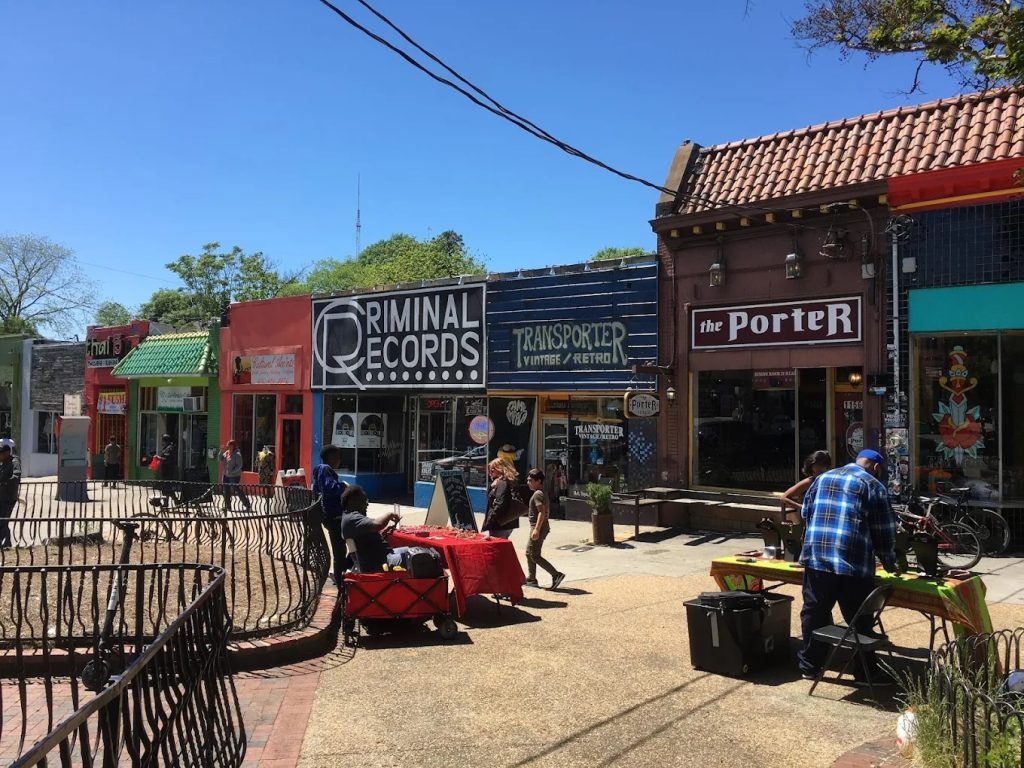
Diane: And there has always been, I believe, both unique retail and more than one active theater in the area.
Kelly: Retail, we have very strong retail. The Junkman’s Daughter [opened in 1982 by a real Junkman’s daughter and now run by her son, voted one of the 25 best independent stores in America] . [For theater,] we have Seven Stages and the Horizon Theater, which is in the same building as WRFG. They’ve both been here forever.
[And] we actually have four record stores in our community. Most communities can’t even support one, and we have four. That’s a real cool thing about our neighborhood, I think. And they’ve all been here for a long time. Moods Music, that’s been here over 20 years, and Wax ‘N’ Facts that has been here almost 50 years. Criminal Records has been here over 30. Criminal Records has a place where bands come and play. And the other one is Beat Lab, which nobody knows about. It’s a hidden away kind of place. They sell spray paint and records, a lot of DJ equipment.
Diane: And how is the Little Five Points Business Association involved in protecting and improving the neighborhood?
Kelly: I’m not sure exactly how old the Little Five Points Business Association is. Officially, it’s from ’92, but I found records as far back as 1960 and I heard from some people that were around back then that it used to be called the Little Five Points Businessmen‘s Association. So, when our group came in, [we,] of course, changed that right away. We work to promote the businesses as much as we can. We’re getting ready to have a lot of construction in our neighborhood. So, right now, we’re concentrating on how we can try to keep these businesses open during all this construction.
Diane: The WRFG website’s description of this oral history project notes that part of its purpose is to ensure that the stories of this distinctive neighborhood not be lost. I’m wondering what are the threats that the community has faced in the past, and what are the threats that it’s facing now?
Laverne: I’ll say for me, the biggest threat for The Little Five is gentrification. It happens a lot in Atlanta. There’s still a lot of artists and artistic thought here; but, unfortunately, [it] is being sort of homogenized into this thing that’s not unique anymore. And that [uniqueness] is what, in my opinion, is so awesome about this neighborhood. There was nothing like it. There are people who are inspired by Little Five Points. This was one of the most original neighborhoods in the city. [But now,] the landlords are becoming older, and the developers are waiting for some of these rules about what can be developed to change, so that they can come in and develop this cool, funky neighborhood. Unfortunately, if some of these developers get their way, Little Five Points could be turned into something different and the uniqueness of this neighborhood might disappear.
Kelly: In the past, a highway was a big threat, and we fought that. Now, today, it’s rising rent and aging landlords. Paid parking, I think, is a big threat for us because other neighborhoods don’t have paid parking, and so I think a lot of people are going to those neighborhoods instead of us. But mainly growth without caring about the community is a big threat.
Diane: What is the current situation with residential housing in the neighborhood?
Kelly: It’s expensive. I really feel like we were started by people, the artists and a lot of creatives, that have gotten priced out.
Diane: Some of the people interviewed talked about Victorian homes in the area, about people coming in and restoring them. Is that still going on? Are they still there?
Kelly: Most of them have already been restored. Back in the 70s, there was a lot of grant money to restore, and so a lot of it was done back then.
Julie: One of the people I interviewed, who’s lived here all his life, said that, in the 60s or 70s, a lot of young people moved in who were just young and stupid and didn’t know any better and didn’t really understand what it was going to take to fix up these houses. And they just put a lot of sweat equity into it.
Laverne: [There was also] a period in the late 90s and early 2000s where there was a little bit of…, I don’t want to say urban decay, because that’s not the proper term, but there was a little bit of a decline in prices like there was in a lot of neighborhoods in the city. Little Five Points was like the place you wanted to be if you were artistic and you were a part of a lot of social movements; and there was some affordable housing then that was already established by the people who came in in the 60s and 70s who remodeled these old Victorian homes and turned some of them into apartments. [But] now I think some of them have been converted back into single family homes.
Diane: Are the developers looking to tear things down and build new?
Kelly: Some of them. We have one development [that] wanted to go up seven stories. And I live real close to there. I wouldn’t be affected, but I felt so bad for my neighbors because they were going to have seven story condos in their backyard. And then there was another development, and there was an old church that was included that they were talking about changing.
Diane: Slim Chance [local musician], in his interview, talked about the neighborhood coming together against that development and that the project is now on hold.
Julie: I think the developers are so much one size fits all [that] they don’t know how to take the neighborhood into consideration, or they don’t want to because it affects their costs,
Kelly: I have a friend that’s an architect who said that [what is being newly built is] like Burning Man structures, wooden things on horrible concrete slabs. That’s nothing like what we have today with all the history. The City right now is doing zoning changes which are so complicated, and people are voting it in and not really looking at what’s happening.
Diane: You’ve talked about some of the people in the community, but I’d love to hear more stories about people who have been particularly important in protecting the community or strengthening the community.
Julie: I have one. I was just thinking about a woman–her name is Pat–who lived, spent her childhood up until she was about 15 in an adjacent neighborhood but came into Little Five Points a lot, went to the Moreland School, and was familiar with that school. When she was older and had moved away, she worked with the Principal of the Moreland School named Judge Sapp. He started a program to help some of the less fortunate students, and he allied himself with the church that she went to.
And some of these kids were in really dire circumstances. He tried to match the children with adults who had similar interests or something in common. The [adults] would pick [the students] up after school and take them over to the church, and they would do activities and stuff. And so her husband picked up this one child. Both his mother and his sister were prostitutes; and, when [her husband] went to pick him up, [there would] be all these men hanging around in the living room and outside. These were the kind of circumstances that these kids lived in. When that Judge left, they didn’t continue the program. But I think he made a difference by affecting those kids lives, by making that program possible.
Julie: We had Hippy Don. Hippy Don was the owner of the Euclid Avenue Yacht Club, a bar, kind of a motorcycle bar. There were a lot of motorcycle people there, and it was just kind of a melting pot of people. And his mission was to make the customers feel comfortable, even though there were so many different types of people there, motorcycle heads, skinheads, preppies.
Kelly: l remember when he opened, and I remember Inman Park [an adjacent neighborhood] fighting against him opening. And he had this list of people with nicknames, but he told me they wouldn’t let me say these on the air.
Julie: He said a bunch of them in the interview. But then he got to the 7 dirty words that he can’t say, and we had to censor that information!
Kelly: He showed me the list, and I was like, but what about Spider and Maggot, I started naming and…he let me take a copy of his list, and he said, ‘I want you to take it home and add on to it.’
Julie: Oh, that’s funny. Apparently the bartender had a degree in literature, and one of the guys that he mentioned was Defenestration Steve. I had a little vocabulary lesson interviewing him about what defenestration politics is. He said it was England, but I found out later it was in France that it originated.
Laverne: I don’t have a story about a particular person, but I did hear this story multiple times, and I’m sure Julie and Kelly have heard this story too. There was a time, probably early 90s, maybe late 80s, when the Ku Klux Klan came to Little Five Points.
[Julie] talked about how there were so many different people in the community. And, when I talked to Slim Chance, and when I talked to some of the people at Seven Stages, there was a story that the Ku Klux Klan came here; and everybody, all of these different people, the punk kids, the black kids, the gay kids, the redneck kids, everybody came together and counter protested the Klan. And Slim Chance actually told me that the Klan got heckled and protested against so much they had to be escorted out of the neighborhood by the police for their protection.
And you know, as a Black woman who grew up in the South in the 80s and 90s, I was taught to have a healthy fear of the Ku Klux Klan and leave in any situation that they may be part of immediately. In the interviews that I heard from some of the residents of the neighborhood, people from different backgrounds came together and said, ‘You’re not going to do this in our neighborhood,’ that’s great.
Diane: And I believe he ended that story by saying, “We understand that diversity is strength.”
Kelly: We went through that time where we had a lot of skinheads in the neighborhood; and a lot of people don’t realize this but our skinheads that we had here were not racist. I could see them standing up to the KKK.
Diane: So let’s talk now about the project itself. How did it start? Why did it start? And how did WRFG get involved?
Laverne: In the 1970s, WRFG did an oral history project called the Living Atlanta series; and, back then, the team talked to residents of Atlanta about the history of Atlanta from World War I to World War II. We rebroadcast that series for our 50th anniversary on air in 2023. and there was a lot of interest in renewing that project.
But, because the Living Atlanta Series was so big, we couldn’t take on a project that size. So a decision was made that we would try to do an oral history of our neighborhood, start with the neighborhood, and see if we could potentially branch out because the history of Little Five Points is actually a history of Atlanta, a small part of Atlanta, but it is a history of Atlanta.
Kelly: And the Little Five Points Business Association reached out to WRFG. About the same time, 2022 maybe or so, 2023, we got into the Atlanta Main Street program. And Reid and I, who was our Main Street Coordinator, went to one of their conferences. A lot of the conference was about oral history projects. And so we decided then that we wanted to do it.
I knew that there was the grant [from Georgia Humanities] that WRFG got, and so I went to Chris [Hollis] and said, ‘Hey, you know, how can we partner on this?’ And we ended up partnering. One of the girls on our committee worked at the Atlanta History Center. They had this new program where they would teach you how to interview people and give you all the equipment to do it. So we set up that meeting with the History Center and us and whoever wanted to come be interviewers. We did a couple of interviews. It’s a national program that is all about arts and culture and the preservation of arts and culture and small neighborhoods. And, even though we’re in the city, we’re still kind of considered a small neighborhood in the city.
Diane: And what’s the name of the national organization?
Kelly: Well, there’s Atlanta Main Street, there’s Georgia Main Street, and there’s Main Street America (https://mainstreet.org). We kind of belong to all of them. We go to these national conferences every year where they do a lot of training, and we get to meet other cities and compare. My favorite part about it, actually, is that we do get together with all the main streets in the city of Atlanta. There’s six. We get together once a month, and we talk about what different things we’re having issues with.
Laverne: WRFG is an organization of mainly volunteers. There’s only three of us on staff who get paid. So. after we had a meeting with the Kenan Research Center at the Atlanta History Center (https://www.atlantahistorycenter.com/buildings-and-grounds/kenan-research-center) on how to do the interviews, a few of our volunteers, especially Julie, took up the mantle and said, ‘Okay, we’re going to get interviews from the community members.’ We interviewed them at their homes, we interviewed them at restaurants, we interviewed them in the studio. We collected those interviews and readied them for broadcast. And some of them didn’t air because of sound quality issues. We’re going to try to get some more software to fix some of those because, unfortunately, some of the people who were interviewed by Kelly and the Business Association have recently transitioned. We do have some of their stories in the archives that we’re going to work on, getting the sound levels at a better quality, so that they can be broadcast. Our hope is to continue this project on an ongoing basis because WRFG does have a history of doing oral history projects with the Living Atlanta series that was done back in the 70s and 80s.
Diane: So, as time goes on, you’ll be adding interviews to the ones that are already on the WRFG website?
Kelly: Yes. I think of new people all the time, and I have to look at the list and go, ‘Is this person on here?’ And I think, if I’m doing that, I’m sure others are. It’s already up to like 90.
Diane: Wow! That makes it a really ongoing project.
Kelly: The more people who get involved, the more people we can get on the list.
Julie: And I think we need more working on getting the buzz going about it.
Laverne: That would help. [The] grant from Georgia Humanities [will] help us with some of the sound software and some of the things that we need to edit interviews and make them high quality.
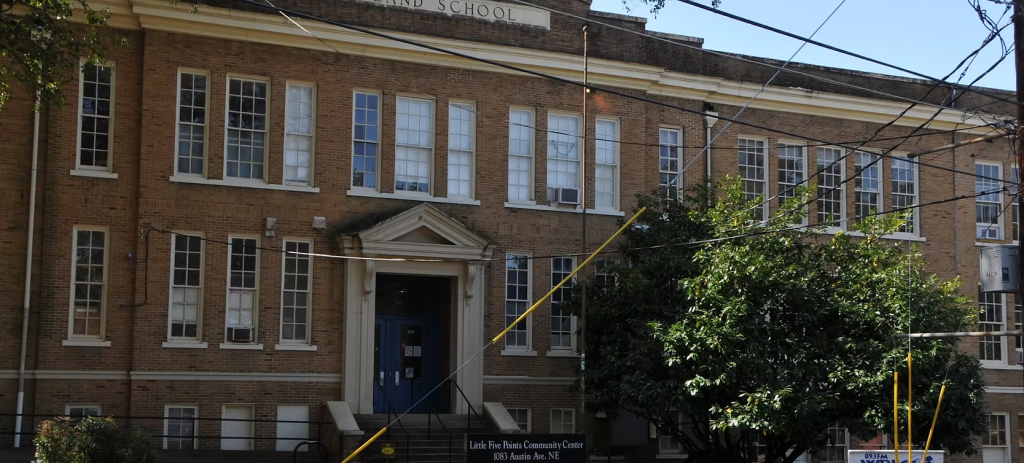
Diane: And, as you said, you’re working with an all-volunteer staff. Let’s talk more about the station. WRFG has been in Little Five Points since 1973. Is that right?
Laverne: Well, it’s been Little Five Points adjacent. Our offices and studios are located in the Moreland School. WRFG bought the Moreland School in Little Five Points in 1982. It was an old school in the city of Atlanta. They were closing the elementary school, and nobody knew what was going to happen because it’s sort of in the heart of the community. And WRFG bought it and moved permanently into this building and turned it over to the Little Five Points Community Center. So the building now is the Little Five Points Community Center, but WRFG offices are based here. We have very deep roots in the community. We partner with organizations like the Little Five Points Business Association and our local record store.
Diane: Is there more anyone wants to say about WRFG’s connection to the community or its work with the community?
Julie: I want to add something about the music. I do an Americana music program. So some of us who do Americana and blues programs have been committed to giving local artists a venue to play music to get exposed to our listeners. We’ve been hosting singer/songwriter in the round concerts. The concerts are generally held here in our gallery which holds about 35 people. We’re on our 10th one at the end of June. And that’s our commitment to local Atlanta and Georgia artists.
We also have a [new] initiative this year. [For] our concert at the end of June, we’re going out to the listeners. We’re a 100,000 watt station. We have a large area that we cover, so we’re going to try locating at a different location for the concert and see how that goes. It’s kind of like a go-to-the-listener initiative.
Laverne: We also pay them too. It’s important for us to support them not only with the opportunity to play their music, but we also want to be sure that we’re paying them to do what we can for them to bring their art to us and to our audience in these singer/songwriter in the round concerts.
Diane: And that outreach and financial support is an ongoing reaffirmation of your commitment to the community.
Laverne: WRFG, I dare say, [is] one of the most diverse stations in the city of Atlanta. We have a lot of community-based programming. Our tagline is ‘Your station for progressive information and handpicked quality music.’ We have the Labor Forum on Mondays that talks about labor rights. We’re part of a lot of the movements here in the city. We have programs about LGTBQ+ youth, [programs] about women’s health. We have programs about spirituality. I mean, it runs the gamut.
And so, for us as a station, it’s very important that we are part of the community. We go to a lot of the neighborhood festivals that happen here. We’ve sponsored some events. We have provided resources for immigrants. It’s super important for us to be a part of Little Five Points because of the support that we’ve received from Little Five Points for over the past, gosh, 50 years. We’re going into our 52nd Anniversary in July. So, for over 50 years, this community has supported us, and it’s important for us to be a part of this community and to support it in any way we can.
Diane: And the station is in a community center that the station helped establish, kind of the perfect image for the work a community station does. Thank you all for your time.
Learn more about Little Five Points and take self-guided historical walking tours.
Top photo: WRFG 50th Anniversary Event. Uncredited.
